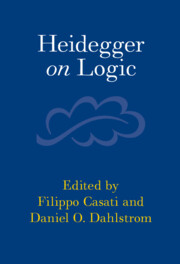Book contents
- Heidegger on Logic
- Heidegger on Logic
- Copyright page
- Contents
- Contributors
- Acknowledgments
- Method of Citation
- Introduction
- Part I Normativity, the Phenomenology of Assertions, and Productive Logic
- Chapter 1 Heidegger’s Phenomenology and the Normativity of Logic
- Chapter 2 Heidegger on the Changeover in Assertions
- Chapter 3 Heidegger’s Productive Logic
- Part II Language, Logic, and Nonsense
- Part III Paradox, the Prospects for Ontology, and Beyond
- Part IV Logical Principles and the Question of Being
- References
- Index
Chapter 3 - Heidegger’s Productive Logic
from Part I - Normativity, the Phenomenology of Assertions, and Productive Logic
Published online by Cambridge University Press: 15 September 2022
- Heidegger on Logic
- Heidegger on Logic
- Copyright page
- Contents
- Contributors
- Acknowledgments
- Method of Citation
- Introduction
- Part I Normativity, the Phenomenology of Assertions, and Productive Logic
- Chapter 1 Heidegger’s Phenomenology and the Normativity of Logic
- Chapter 2 Heidegger on the Changeover in Assertions
- Chapter 3 Heidegger’s Productive Logic
- Part II Language, Logic, and Nonsense
- Part III Paradox, the Prospects for Ontology, and Beyond
- Part IV Logical Principles and the Question of Being
- References
- Index
Summary
According to Heidegger, Being and Time engages in a “productive logic” that discloses the being of the entities in various fields by generating new concepts. However, he does not explain just how his productive logic operates. This chapter examines two of his typical practices that embody such a logic: verbalization (turning nouns into verbs, as in “the world worlds”) and the phenomenology of deficient modes (exceptions that prove the rule, such as being alone as a deficient mode of being-with). Verbalization invites us to form concepts that indicate the way of existing, or being actual, that distinguishes entities in a certain domain. The concept of a deficient mode challenges us to take a concept that is normally one of a pair of ontic opposites and transform it into an ontological concept that covers both opposites and describes fundamental features of a certain domain. In addition to explaining both of these forms of productive logic, the chapter considers and replies to several objections to these procedures.
- Type
- Chapter
- Information
- Heidegger on Logic , pp. 53 - 70Publisher: Cambridge University PressPrint publication year: 2022

